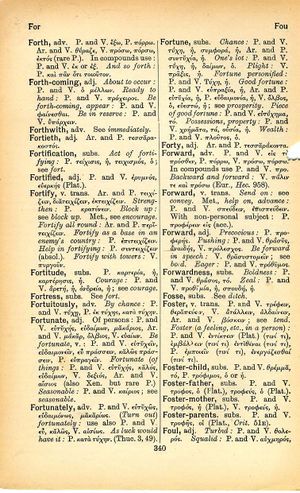fortunate
ἢ τοὺς πότους ἐρεῖς δῆλον ὅτι καὶ τὰ δεῖπνα καὶ ἐσθῆτα καὶ ἀφροδίσια, καὶ δέδιας μὴ τούτων ἐνδεὴς γενόμενος ἀπόλωμαι. οὐκ ἐννοεῖς δὲ ὅτι τὸ μὴ διψῆν τοῦ πιεῖν πολὺ κάλλιον καὶ τὸ μὴ πεινῆν τοῦ φαγεῖν καὶ τὸ μὴ ῥιγοῦν τοῦ ἀμπεχόνης εὐπορεῖν; → There you'll go, talking of drinking and dining and dressing up and screwing, worrying I'll be lost without all that. Don't you realize how much better it is to have no thirst, than to drink? to have no hunger, than to eat? to not be cold, than to possess a wardrobe of finery? (Lucian, On Mourning 16)
English > Greek (Woodhouse)
adj.
Of persons: P. and V. εὐτυχής, εὐδαίμων, μακάριος, Ar. and V. μάκαρ, ὄλβιος, V. εὐαίων. Be fortunate, v.: P. and V. εὐτυχεῖν, εὐδαιμονεῖν, εὖ πράσσειν, καλῶς πράσσειν, P. εὐπραγεῖν. Fortunate (of things: P. and V. εὐτυχής, καλός, εὐδαίμων, V. δεξιός, Ar. and V. αἴσιος (also Xen. but rare P.). Seasonable: P. and V. καίριος; see seasonable.
Latin > English (Lewis & Short)
fortūnātē: adv., v. fortuno,
I P. a. fin.
Latin > French (Gaffiot 2016)
fortūnātē¹⁵ (fortunatus), adv., d’une manière heureuse : Cic. Fin. 3, 26 || -tius Plin. 3, 125.
Latin > German (Georges)
fortūnātē, Adv. (fortunatus), gesegnet, beglückt, glücklich, quam facile et quam fortunate evenit illi, obsecro, mulieri, quam liberare volt amator, Plaut. Epid. 243: bene et f. vivere, Plaut. mil. 706: semper feliciter, absolute, f. vivere, Cic. de fin. 3, 26: nihil satis scite aut f. gestum esse, Liv. 10, 18, 5.
Latin > English
fortunate ADV :: fortunately

